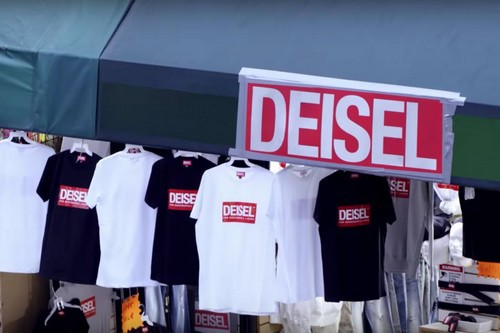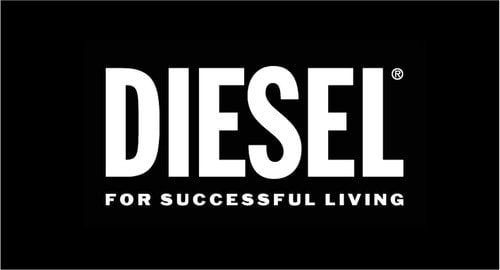The Marketing mix of Diesel analyses the 4Ps of Diesel, including the Product, Price, Place, and Promotions. Diesel is a private limited company of Italian origin. It is associated with the lifestyle and retail industry as it deals in apparel and accessories.
This well-known fashion house was founded in 1978 by its co-founders, Renzo Rosso and Adriano Goldschmied. Diesel is a subsidiary of its parent company, OTB Group. The brand has seen extraordinary growth and is popular because it offers an alternate taste that makes it unique and exclusive. It is an innovative brand known for authenticity, self-expression, individuality, and passion. It faces competition from the following.
- Levis
- Chip and Pepper
- Giorgio Armani
About Diesel
- Type: A lifestyle brand
- Industry: Fashion
- Founded: 1978
- Founders: Renzo Rosso and Adriano Goldschmied
- Headquarters: Molveno, Trentino, Italy
- Area served: Over 80 countries
- Current CEO: Massimo Piombini
- Number of employees: Over 5,000
- Major products: Clothing, footwear, accessories, perfumes, eyewear, watches, and home furnishings
Table of Contents
Diesel Product Strategy
Diesel is a fashion brand specializing in apparel, accessories, and footwear. It operates via two brands: Diesel Black Gold and Diesel. It has also launched a clothing line for kids called Diesel Kid. The brand offers a fragrance line that is marketed and owned by L’Oreal.
The new Product Mix of Diesel in 2023 is as follows (Source).
- Denim: Diesel is renowned for its expertise in denim, featuring unique designs with innovative techniques and washes.
- Ready-to-Wear Clothing: The brand provides a range of clothing items for both casual and formal occasions.
- Footwear: Diesel’s footwear collection includes various styles for different tastes and occasions.
- Accessories: The brand offers a variety of accessories, enhancing its fashion offerings.
- Fragrances: Diesel has expanded into the fragrance market, adding to its diverse product portfolio.
Diesel’s products in the fashion industry are characterized by a bold, distinctive style that appeals to fashion-forward consumers.
Diesel Place Strategy
Diesel is a global brand with its headquarters based in Breganze, Italy. It started its operations from Molvena in Italy and, with time, has spread successfully in overseas markets.
Products are now sold in Mexico, Japan, New York City, Rome, London, San Francisco, Paris, Barcelona, and Berlin. Diesel operates via several distribution channels and its flagship store, StyleLabs. Its denim products are manufactured only in Italy via several outsourced factories.
Diesel is an exclusive brand that manages its operations via five thousand selling points located in eighty countries with the help of twenty subsidiary companies. The outlets are in critical, central, and prime locations like major malls to attract customers and garner maximum clients. In 1995, Diesel launched an online fashion retail site that showcased images of every collection.
The first products to be sold online were in Finland and Sweden in 1997, and later, the brand opened a virtual store that enabled home delivery to diesel stores to increase its customer base. For its retail lines, Diesel offers illustrated catalogs. Besides Diesel Online Store, it also markets via the help of other e-commerce portals.
Diesel’s place strategy involves:
- Global Retail Presence: Diesel has stores in major cities worldwide, emphasizing its global brand reach.
- Selective Distribution: The brand is available in high-end department stores and exclusive multi-brand retailers, enhancing its premium image.
- Flagship Stores: Diesel operates flagship stores in key fashion capitals, providing immersive brand experiences.
- E-commerce Platform: Diesel has a robust online presence, offering its products through its website and other e-commerce platforms.
- Immersive Retail Experience: The brand’s store designs reflect its innovative and rebellious ethos, offering unique shopping experiences.
Diesel Pricing Strategy
At the end of the fiscal year 2015, Diesel posted its revenues at 2.9 billion Euros. It is a complete Lifestyle brand known for its luxurious and exclusive items. The brand targets the upper and upper-middle-class sections of customer segments of society from an urban area who are fashion, image, and brand-conscious. They want to tag themselves with a high-profile brand to elevate their social status via this brand.
Diesel is a premium brand and has adopted a premium pricing policy for all its products. It targets the wealthy and privileged class, who are least bothered about money matters. The Diesel collection offers unique and qualitative products and boasts that all its products are exclusive, with none having a match in any collection.
It is also not afraid of its competitors and hence does not pay any attention to rival brands’ product prices and marketing strategies. Diesel has been fortunate with the pricing strategy that helps it earn more significant revenues and recognition in the consumer market.
Diesel’s pricing and marketing strategy includes:
- Premium Pricing: Diesel sets higher prices to reflect the quality and uniqueness of its products.
- Strategic Promotions: Occasionally offers discounts to attract a broader customer base while maintaining exclusivity.
- Alignment with Brand Image: Prices match Diesel’s position as a fashionable and innovative brand.
- Selective Discounts: Limited-time offers and promotions to enhance the brand’s appeal.
- Target Market Consideration: Prices are set considering the fashion-forward consumers who value unique styles.
Diesel Promotion Strategy
Diesel has created waves via its impressive advertising campaigns that included surreal images. The highly successful diesel marketing campaigns have used themes like social consciousness, ironic plays related to global issues, and anti-establishment messages.
These groundbreaking ads have been shot in collaboration with leading photographers. Its ads are full of provocation and irony and generate disbelief, laughter, shock, and recognition. Its famous ad campaigns are Be Stupid and Go with the Flow, whereas its famous tagline is For Successful Living.
The brand recognizes the positive impact of celebrity endorsements on social media channels and has roped in Liam Hemsworth and Winnie Harlow to act in its commercials separately in 2015. The ads are shown via fashion magazines, billboards, and social media platforms.
Diesel has a brand loyalty program of its own, D: Code, that offers certain facilities to its members. The brand sends personalized anniversary gifts, birthday gifts, sale previews, access to international parties, access to new collections before the general public, and glimpses behind the scenes.
In 1992, the diesel brand became the title sponsor of the World Superbike Racing Circuit, and in 2007, it was a major sponsor of Diesel-U-Music, a music contest. Diesel at the Cannes Lions International Advertising Festival won The Grand Prix Award in 1997, 2001, and 2010.
The company realized its responsibility towards society and, in 2008, opened The Only The Brave Foundation as a non-profit organization for its CSR activities. It works towards removing social inequality in society. Diesel has received several awards over the years, like Best Italian Company of the Year in 1996 from Bocconi Institute and in 1998 The Label of the Moment from the Wall Street Journal.
Some Recent Video ads and Print ads for Diesel are:
Liked this post? Check out the complete series on Marketing Mix

